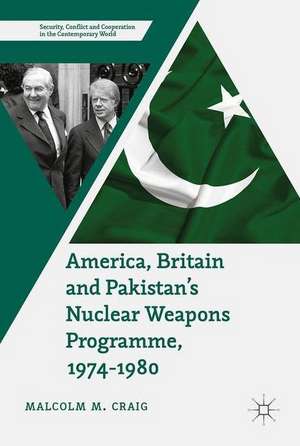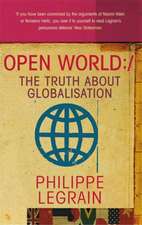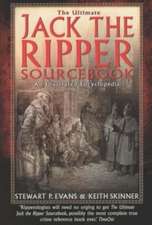America, Britain and Pakistan’s Nuclear Weapons Programme, 1974-1980: A Dream of Nightmare Proportions: Security, Conflict and Cooperation in the Contemporary World
Autor Malcolm M. Craigen Limba Engleză Hardback – 10 iul 2017
This book analyses US and UK efforts to shut down Pakistan’s nuclear programme in the 1970s, between the catalytic Indian nuclear test of May 1974 and the decline of sustained non-proliferation activity from mid-1979 onwards. It is a tale of cooperation between Washington and London, but also a story of divisions and disputes. The brutal economic realities of the decade, globalisation, and wider geopolitical challenges all complicated this relationship. Policy and action were also affected by changes elsewhere in the world. Iran’s 1979 revolution brought a new form of political Islamic radicalism to prominence. The fears engendered by the Ayatollah and his followers, coupled to the blustering rhetoric of Pakistani leaders, gave rise to the ‘Islamic bomb’, a nuclear weapon supposedly created by Pakistan to be shared amongst the Muslim ummah. This study thus combines cultural, diplomatic, economic, and political history to offer a rigorous, deeply researched account of a critical moment in nuclear history.
| Toate formatele și edițiile | Preț | Express |
|---|---|---|
| Paperback (1) | 634.00 lei 6-8 săpt. | |
| Springer International Publishing – aug 2018 | 634.00 lei 6-8 săpt. | |
| Hardback (1) | 639.37 lei 6-8 săpt. | |
| Springer International Publishing – 10 iul 2017 | 639.37 lei 6-8 săpt. |
Din seria Security, Conflict and Cooperation in the Contemporary World
- 9%
 Preț: 765.10 lei
Preț: 765.10 lei - 20%
 Preț: 689.80 lei
Preț: 689.80 lei - 20%
 Preț: 565.89 lei
Preț: 565.89 lei - 20%
 Preț: 629.10 lei
Preț: 629.10 lei - 18%
 Preț: 785.42 lei
Preț: 785.42 lei - 18%
 Preț: 775.15 lei
Preț: 775.15 lei -
 Preț: 386.61 lei
Preț: 386.61 lei - 15%
 Preț: 584.43 lei
Preț: 584.43 lei - 15%
 Preț: 693.25 lei
Preț: 693.25 lei - 15%
 Preț: 527.97 lei
Preț: 527.97 lei - 15%
 Preț: 638.25 lei
Preț: 638.25 lei -
 Preț: 384.86 lei
Preț: 384.86 lei -
 Preț: 481.43 lei
Preț: 481.43 lei -
 Preț: 384.09 lei
Preț: 384.09 lei -
 Preț: 383.12 lei
Preț: 383.12 lei -
 Preț: 391.61 lei
Preț: 391.61 lei - 15%
 Preț: 638.76 lei
Preț: 638.76 lei - 18%
 Preț: 778.45 lei
Preț: 778.45 lei -
 Preț: 390.63 lei
Preț: 390.63 lei -
 Preț: 385.84 lei
Preț: 385.84 lei - 15%
 Preț: 471.69 lei
Preț: 471.69 lei - 15%
 Preț: 586.55 lei
Preț: 586.55 lei -
 Preț: 385.25 lei
Preț: 385.25 lei -
 Preț: 383.33 lei
Preț: 383.33 lei - 18%
 Preț: 731.10 lei
Preț: 731.10 lei - 18%
 Preț: 891.80 lei
Preț: 891.80 lei - 15%
 Preț: 699.77 lei
Preț: 699.77 lei - 15%
 Preț: 703.20 lei
Preț: 703.20 lei - 15%
 Preț: 588.18 lei
Preț: 588.18 lei -
 Preț: 386.81 lei
Preț: 386.81 lei - 18%
 Preț: 786.36 lei
Preț: 786.36 lei - 15%
 Preț: 638.57 lei
Preț: 638.57 lei -
 Preț: 380.63 lei
Preț: 380.63 lei -
 Preț: 390.63 lei
Preț: 390.63 lei
Preț: 639.37 lei
Preț vechi: 752.20 lei
-15% Nou
Puncte Express: 959
Preț estimativ în valută:
122.36€ • 127.27$ • 101.01£
122.36€ • 127.27$ • 101.01£
Carte tipărită la comandă
Livrare economică 15-29 aprilie
Preluare comenzi: 021 569.72.76
Specificații
ISBN-13: 9783319518794
ISBN-10: 3319518798
Pagini: 340
Ilustrații: X, 319 p.
Dimensiuni: 148 x 210 x 23 mm
Greutate: 0.54 kg
Ediția:1st ed. 2017
Editura: Springer International Publishing
Colecția Palgrave Macmillan
Seria Security, Conflict and Cooperation in the Contemporary World
Locul publicării:Cham, Switzerland
ISBN-10: 3319518798
Pagini: 340
Ilustrații: X, 319 p.
Dimensiuni: 148 x 210 x 23 mm
Greutate: 0.54 kg
Ediția:1st ed. 2017
Editura: Springer International Publishing
Colecția Palgrave Macmillan
Seria Security, Conflict and Cooperation in the Contemporary World
Locul publicării:Cham, Switzerland
Cuprins
Chapter 1: Introduction.- Chapter 2:“No hope of preventing proliferation” From the Indian Nuclear Test to the Politics of Limited Choice, May 1974 to December 1975.- Chapter 3: “An end to the first ‘easy’ phase” Pakistan’s Nuclear Reprocessing Plant Deal and the Clandestine Programme’s Discovery, January 1976 to January 1977.- Chapter 4:“The omens are scarcely encouraging” Jimmy Carter, Nuclear Reprocessing, and the Clandestine Programme, February 1977 to March 1978.- Chapter 5:“We do find this statement of intentions to be disuieting” The US-UK Diplomatic Campaign Against Pakistan, March 1978 to December 1978.- Chapter 6: “A dream of nightmare proportions” The ‘Islamic bomb’ and the ‘Khan Affair’, January 1979 to December 1979.- Chapter 7: “Dead end” The Failure of Political Solutions to Pakistan’s Nuclear Ambitions, January 1979 to December 1979.- Chapter 8: “Peanuts” The Cold War and the Death of Non-proliferation, January 1980 to January 1981.- Chapter 9:Conclusion.
Recenzii
“It is a book that exemplifies the limitations of American global power in the precarious times of the 1970s. … It is an important book for scholars of twentieth-century international history, post-1947 South Asia, the history of foreign relations, transatlantic relations, and those passionate about politics of nuclear weapons and nuclear technologies. … Craig’s meticulously researched monograph fills an important lacuna in the extant scholarship.” (Jayita Sarkar, H-Diplo, H-Net Reviews, April,2018)
Notă biografică
Malcolm Craig gained his PhD from the University of Edinburgh in 2014, and has taught at Edinburgh, UK, Victoria University of Wellington, NZ, and is currently Lecturer in History at Liverpool John Moores University, UK. His research focuses on American and British foreign policy in the post-1945 period, with particular interests in national security, nuclear proliferation, state secrecy, and the role of the media.
Caracteristici
Draws on some of the most recently declassified British and US government documents to explore the relationship between the US, UK and Pakistan’s nuclear programme in the 1970s Offers an important addition to the historiography of the ‘special relationship’ between the US and the UK, nuclear non-proliferation, and the post-colonial world Expands and furthers the debate on the role and salience of the cultural construct of religion in foreign affairs and on those who make foreign policy















